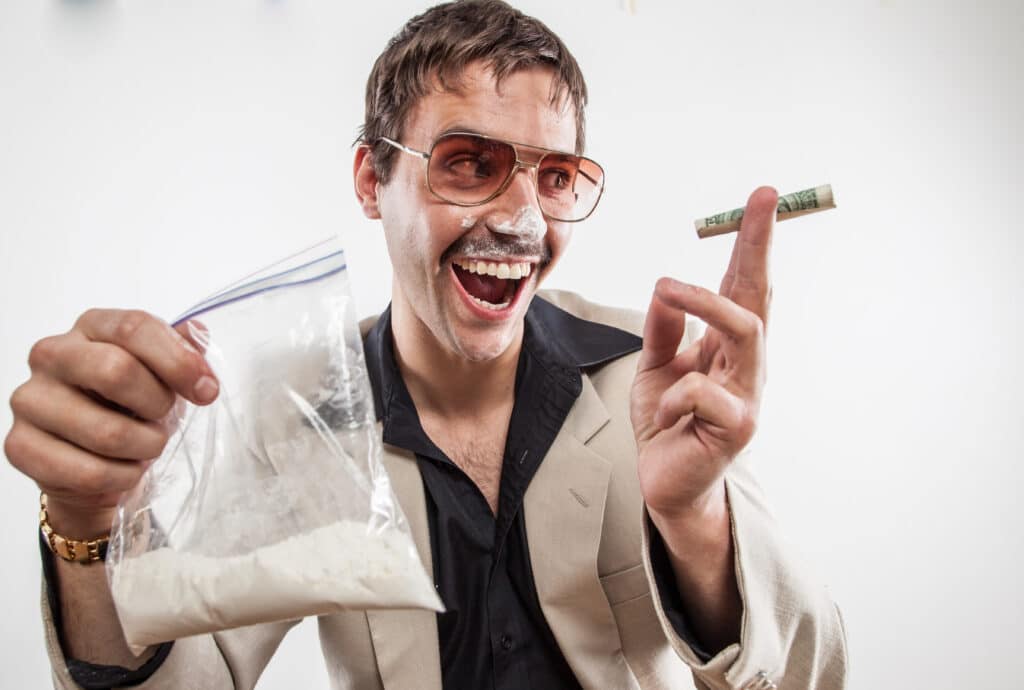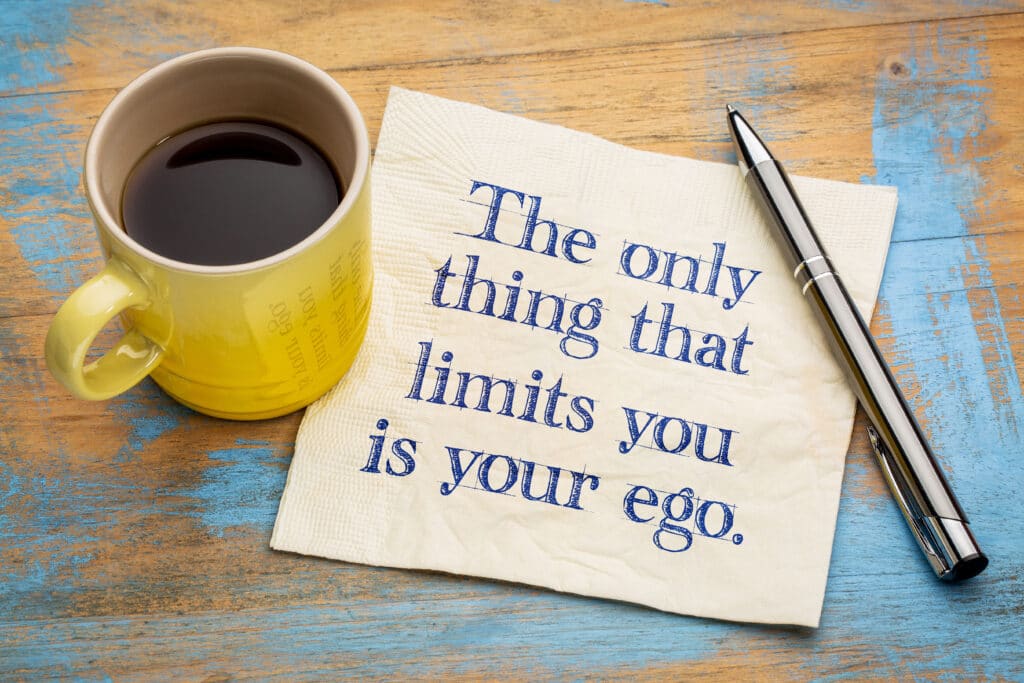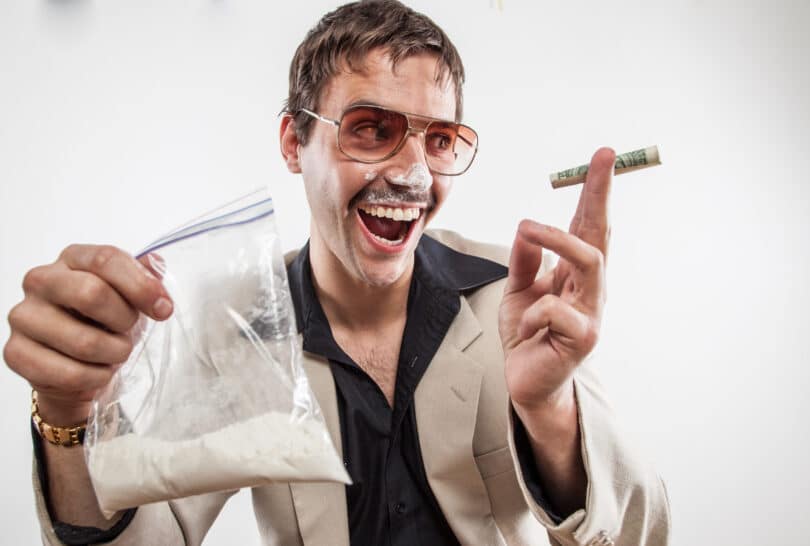Have you ever found yourself stuck talking to a coke-fueled ego maniac at a party? Or, let’s be even more honest here, have you ever realized after a night out that you were in fact that same coke-fueled ego maniac? Well, regardless of whether it’s you or someone else, the truth is that cocaine – for all of its ‘helpful’ confidence boosting – can definitely make people speak a lot more about themselves.
Cocaine, a powerful stimulant derived from the coca plant, has long been associated with heightened self-confidence, euphoria, and talkativeness. For decades, it has been a party drug of choice, often noted for its ability to make users speak at length about themselves and their experiences. But why is this? We’re going to delve into this question, understanding where this ego boost comes from, and why no one seems to acknowledge that it’s happening to them.
What is Cocaine?
Before we talk about the egotistical tendencies that coke can cause, let’s have a quick reminder of what cocaine actually is. Cocaine is a powerful central nervous system stimulant drug that is derived from the leaves of the coca plant, which is native to South America. It is a highly addictive substance that has been used for centuries by indigenous peoples in the Andes for its stimulant effects.
When it was first discovered, the substance was seen as one sent from the gods due to its medical benefits and ability to reduce the feeling of hunger. Nowadays, cocaine is one of the most common party drugs used around the world. Coke is classified as a Schedule II controlled substance in the United States, and it typically comes in the form of a white powder and can be ingested in various ways, including snorting, injecting, or smoking. The effects of the substance include:
- Euphoria: Cocaine use can induce intense feelings of pleasure and well-being.
- Increased energy and alertness: Users often experience increased energy levels, heightened alertness, and a decreased need for sleep.
- Increased heart rate and blood pressure: Cocaine is a powerful stimulant that can lead to elevated heart rate and blood pressure, which can be dangerous, especially for individuals with heart conditions.
- Increased confidence and talkativeness: Users may feel more confident and talkative when under the influence of cocaine.
The last effect listed is what is significant for this article. The reason why cocaine does make people so confident and able to talk about themselves – with often very little filter – is sometimes mind boggling. In fact, a whole group of people being on the drug, can often make it impossible for you to be the only one not on it. Unless, of course, you want the most boring night of your life, with no one having any interest in what you’re up to or who you are.
Cocaine Confidence – The Ego Boost

Before diving into the psychology behind cocaine-induced self-expression, it’s important to understand the drug’s effects. Cocaine primarily affects the central nervous system, leading to increased alertness, energy, and a sense of invincibility. Users often report feeling more self-assured and charismatic, which can lead to an overwhelming desire to share their thoughts and experiences with others. One of the most significant effects of cocaine is the surge in self-confidence.
If you’ve ever taken the substance, or have seen someone that has, you’ll notice this sudden belief that you can do anything, talk about anything, be anything. It’s like you’ve just been given a pep talk by the greatest life coach ever. You feel, in a lot of ways, invincible. Cocaine temporarily increases levels of dopamine, a neurotransmitter associated with pleasure and reward.
This dopamine rush can lead users to feel more confident, outgoing, and self-assured than they do in their sober state. This newfound confidence can be a driving force behind the desire to talk about oneself. Imagine, you’re filling up with dopamine, feeling incredible, and the only way to release all of this new-found happiness is to let it out… perhaps verbally. Vice News writes:
“Of course, not everyone turns into a big sentient clenched jaw after half a gram—lots of us can do cocaine without becoming self-obsessed or arrogant or devoid of all self-awareness. But some of us can’t, which is where the “cocaine dickhead” archetype comes from: the girl who won’t stop banging on about her screenplay; the guy who wouldn’t be able to gauge the vibe of the room (extremely anti-him) if it was written out in spray paint on the wall.”
These archetypes, whilst comical, are unfortunately completely accurate. There seriously isn’t much worse than being stuck being talked at by someone who’s taken a copious amount of this specific substance. “Yeah I work in recruitment, mate. It’s alright but I’ve actually been thinking about doing something else. You know? Or maybe travelling. I feel like I need to see the world and get out of this suffocating suit. You know?” As Vice reports, not everyone turns into an egotist when consuming cocaine, but it certainly is not uncommon.
Why?
So it seems the only question to really ask is: why? Why does cocaine cause people to feel like they need, without any censorship, to talk about themselves. In addition, why do they also not realise how much they’re doing it. Well, festival welfare worker Katy Mcleod (director of Chill Welfare), says in Vice:
“Cocaine tends to make people go into themselves, so they can either become introverted or be very sociable but a bit dominant or self-involved… One big issue with coke is how it makes you feel in yourself and how you come across to others when under the influence. The two don’t always match up. You might think you’re being really witty and outgoing, when other people just think you’re a twat.”
So, as you can see, there’s a dichotomy here. There’s how you feel about yourself, and there’s how the world perceives you. To be fair, this probably exists most of the time anyway but, when cocaine is consumed, the difference is a lot more extreme. This comes from the dopamine hit that coke gives.
Euphoria and Ego Inflation

Cocaine’s primary mechanism of action involves blocking the reuptake of dopamine in the brain. This results in an accumulation of dopamine in the synapses, leading to intensified feelings of pleasure and reward. The increased dopamine levels reinforce behaviour associated with the drug’s effects, including self-expression. Cocaine also induces euphoria, a state of intense happiness and well-being. This elevated mood can lead users to believe they are more interesting, intelligent, and captivating than usual. As a result, they may feel compelled to share their thoughts, stories, and opinions, convinced that they are the centre of attention. Essentially, you not only feel great, but you also think you are great. Hired Power writes:
“It boost’s a user’s ego and self-confidence, making the user believe that he is the most powerful person in the room.”
Cocaine gives you license to have social confidence, as well as confidence in yourself, which can be quite extreme. This doesn’t sound too bad, does it? Well it wouldn’t if you didn’t then spend an entire evening thinking that your voice deserves to be heard by everyone all night. The danger in an ego boost is that it can make you blind. Make you believe that you are the boss. Again, there’s nothing wrong with self-belief, but too much can become arrogant and hugely irritating.
Final Thoughts on Cocaine Ego Boosts
Scientifically the ego-boost phenomenon of cocaine makes sense. A boost of dopamine, energy and confidence, makes users believe that they are the bees knees and they want people to know it. For some, with social anxiety, this can be a great moment – finally able to speak to people like they want to. For others, this can be an enhancement in ego they simply do not need. These sorts of people are the ones you want to avoid at parties, unless of course you want to hear (for hours on end) about their very interesting ideas on modern politics.
It’s important to say, of course, that cocaine is a highly dangerous substance and is incredibly addictive. This ego-boosting effect of cocaine is perhaps one of the most addictive parts of it and, worst of all, it can make it very hard to have any self-confidence without the substance. The effects of cocaine may be harnessed for that initial boost of confidence before an event, but those effects can very easily create an ego-tistical monster if you’re not careful.
Hello readers. We’re happy to have you with us at Cannadelics.com; a news source here to bring you the best in independent reporting for the growing cannabis and hallucinogen fields. Join us frequently to stay on top of everything, and subscribe to our Cannadelics Weekly Newsletter, for updates straight to your email. Check out some awesome promos for cannabis buds, smoking devices and equipment like vapes, edibles, cannabinoid compounds, amanita mushroom products, and a whole bunch more. Let’s all get stoned together!







